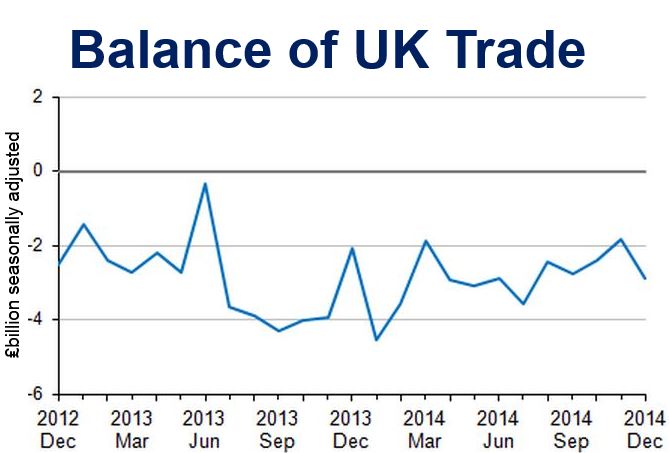Britain’s trade deficit in goods and services widened to £2.9 billion in December, compared to £1.8 billion in November. From November to December, exports fell by less than £0.1 billion to £42.1 billion while imports expanded by £1 billion to £45 billion.
A trade deficit is when the value of imported goods and services is higher than the value of exports.
According to the Office for National Statistics, the total trade deficit in goods and services for the whole of 2014 was £34.8 billion, the largest deficit since 2010 (£37.1bn).
In 2014, the value of both exports and imports declined, but exports more significantly. The widening deficit was mainly due to the export of goods, which fell by £14.6 billion compared to 2013, while imports declined by £7.3 billion, the first time imports fell since 2009.

Source: Office for National Statistics.
Trade in fuels dropped considerably. Exports of fuels declined by £6.4 billion while imports of fuels were £9.8 billion down in 2014 compared to 2013.
The deficit on trade in goods in December 2014 was £10.2 billion, which was £0.9 billion lower than in November. Exports increased by less than £0.1 billion in December from November, while imports increased by £0.9 billion.
Exports of oil in value terms rose by £0.2 billion in December, while the volume of exports increased by 22.7%, the highest level since July 2012.
In December 2014, goods imports increased by £0.9 billion, of which £0.7 billion consisted of rising fuels imports, specifically oil (up by £0.6 billion). Oil imports by volume rose by 37.5% between November and December, reaching its highest level since July 2008.
Imports of finished manufactures increased by £0.4 billion in December, of which £0.3 billion was attributed to aircraft imports.
The Conservative Party, which is currently in power and faces a general election in May, was hoping that exports would play a greater role this year. However, with the Eurozone, the UK’s main trading partner, showing no signs of recovering from virtually zero growth and falling prices, it seems unlikely exports will rebound strongly.
The British Chambers of Commerce expressed disappointment at December’s trade figures. Its Chief Economist, David Kern, said:
“After a welcome pick up in the past two months, it is disappointing that our trade position weakened in December. While monthly figures can be erratic, the longer terms trends are still concerning – the deficit widened to a four year high in 2014 and exports fell more significantly than imports.
“We are clearly not making adequate progress in rebalancing our economy, and the weakening of the Eurozone is creating problems for our exporters. Much greater efforts are needed to develop a national strategy for boosting exports, with improved access to finance for growing firms.”
